ROUNDUP: JAPANESE CINEMA SPLASH AT THE 29TH TIFF

Watanabe Brothers’ Poolsideman Triumphs at the 29th TIFF

Koji Fukada, Tetsuaki Matsue, Hiroshi Shoji — these acclaimed young Japanese filmmakers were all discovered at the Tokyo International Film Festival (TIFF), which devotes an entire section to cutting-edge Japanese film. Aptly named Japanese Cinema Splash, the section always contains hidden gems by new talent who are enriching film culture. This year, eight films were selected by TIFF Programming Director Yoshi Yatabe to compete for the Best Picture Prize, which comes with a cool ¥1 million in prize money.
Among the Splash films, the freshest entry was by Yutaro Nakamura, who brought his freshman feature Grab the Sun. Collaborating with rising newcomer Kaito Yoshimura, Nakamura extracts raw emotions and the fragile sensitivity of Japanese youths in the big, bad city. All the actors – Yoshimura, Kodai Asaka and Yukino Kishii – shine in Grab the Sun, a love triangle with drugs and violence. However, although some scenes are powerfully presented, the undeveloped female character and sexual harassment might offend some insightful viewers.
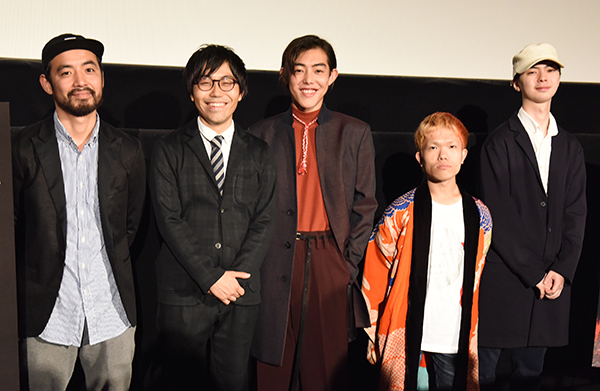
Sound of Waves must have been a pleasant choice for cinephiles of Japanese cinema: the first feature in 11 years by Kaze Shindo, filmmaker of the acclaimed Love/Juice (2000) and daughter of legendary writer-director Kaneto Shindo. Her long-waited feature is the conventional tale of a sensitive girl and an inspiring violinist in the Okinawan islands. Starring Sakura Ando (100 Yen Love), Sound of Waves is a film for everyone, with tear-jerking moments that will appeal to every audience; but its conventionality and lack of surprises might disappoint Love/Juice followers.
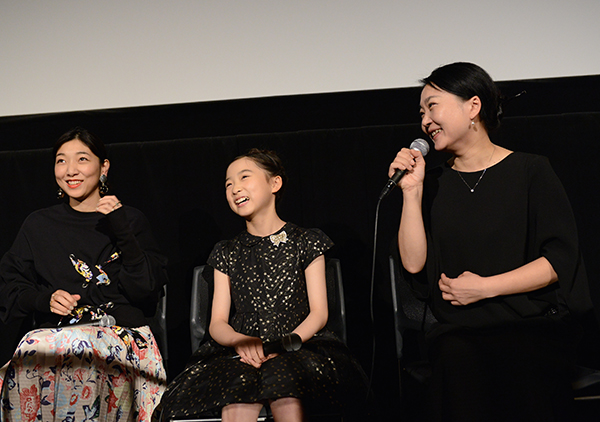
Going the Distance by Yujiro Harumoto was one of the section’s most lauded selections, and many had tipped it for the prize. The story is about a boxing trainer (Shinichiro Matsuura) who’s torn between loyalty to his best friend, a fellow orphan (Masahiro Umeda), and his fiancée (Yumi Endo). The two friends are caught up in a scam that eventually leads to tragedy, mostly due to the trainer’s inability to communicate. Audiences were surprised to hear that the events of the film, which is shot in a raw, hand-held style, actually happened to Matsuura.
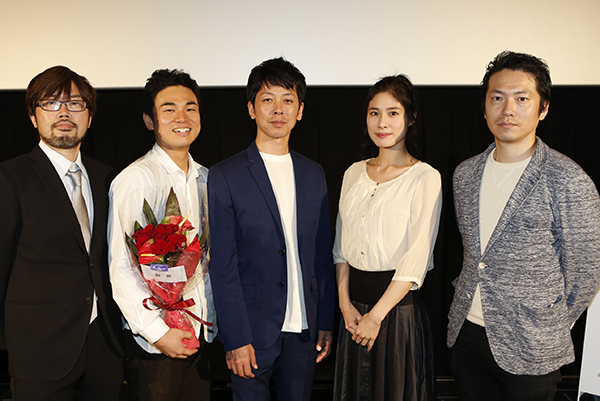
Shin Adachi, screenwriter 100 Yen Love, which won Japanese Cinema Splash section in 2014, returned to TIFF for his directorial debut, 14 That Night. Although the film has the semblance of an erotic comedy with horny teenagers and a goofy quest to meet a porn star, Adachi takes underlying issues into serious consideration, depicting the disquieting reality of life in the countryside. Notably, veteran Ken Mitsuishi steals the show, playing a milquetoast father who becomes the fundamental reason the protagonist’s escape from home.

Idiosyncratic filmmaker Rikiya Imaizumi returned to TIFF for the second year in a row with his new feature, Same Old, Same Old. Imaizumi’s singular style hasn’t really changed – long takes, no close-ups, non-emotional acting – but the latest feature is actually his deepest work. The filmmaker boldly tackles unanswerable questions of life and death. Equipped with a narrative structure similar to his Sad Tea (2013, also at TIFF), this ensemble dramedy with too many characters and surprising shifts will surely be appreciated by Imaizumi followers.
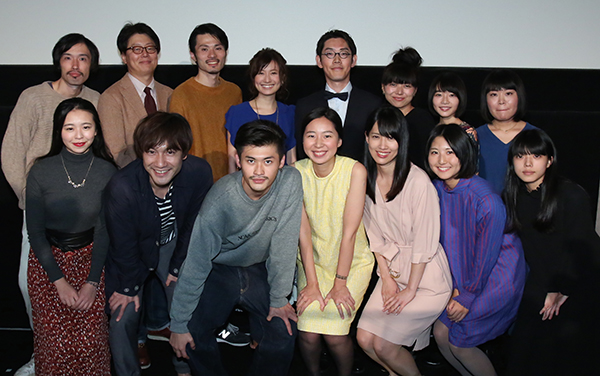
The multi-talented Kenji Yamauchi also achieved his second appearance in Japanese Cinema Splash two years in a row, and his latest, At the Terrace, is a cinematic adaptation of the award-winning play “Trois Grotesques,” written by Yamauchi himself. It was one of the most popular titles in the section, with foreign audiences raving about its comedy but suggesting it could be more cinematic. Interestingly, Yamauchi purposely chose to present it as theater, defying the usual cinematic challenge to translate stage work onto celluloid. As a result, the filmmaker successfully presents the buildup of hilarious humor and intense female battles during a chaotic dinner party with seven characters as faithfully as the original hit production.
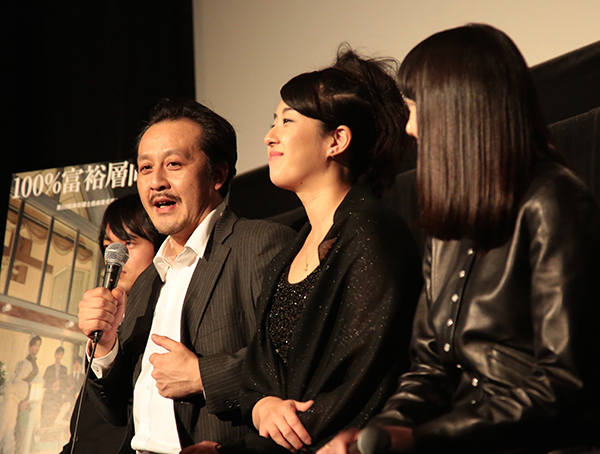
A hidden gem from this year’s Cinema Splash was Hello, Goodbye. Carefully scripted and convincingly staged, the debut feature by Takeo Kikuchi, long-time assistant director of Takahisa Zeze and Kiyoshi Kurosawa, tells the story of the compelling friendship of two unsatisfied high school girls, one at the highest of the school hierarchy and the other at the bottom. Screenwriter Ayako Kato is able to get into the usually indecipherable minds of the two protagonists in a comprehensible way, and the narrative brings strong empathy for them. Of course, the film would not work without the convincing performances by Minori Hagiwara and Sayu Kubota.

Although TIFF Programming Director Yoshi Yatabe has cultivated a number of promising filmmakers, one of his favorites is the Foolish Piggies team of director Hirobumi Watanabe and composer-producer Yuji Watanabe, who brought us the indie hit And the Mud Ship Sails Away… (2013) and the controversial 7Days (2015), both of which also appeared in Cinema Splash. The brothers’ latest, the challenging Poolsideman, deserved the Best Picture Prize, and the jury happily selected it. Collaborating with their usual cinematographer, Woohyun Bang, the Watanabes’ Poolsideman offers dozens of symmetric, aesthetic shots of mundane daily life, reminiscent of the black-and-white films of Stanley Kubrick. Differentiating from these stationary shots, another iconic shot is repeated throughout the film: a sort of shaky long-take with handheld camera, frequently seen in contemporary European cinema. No other images of Japanese filmmakers are as carefully framed and fastidious as the alluring cinematography of the Bang-Watanabe Brothers collaboration.

Armed with this masterful achievement of cinematic form, Poolsideman also flabbergasts viewers with its thematic concerns. Simply put, the film follows the daily occurrences in the life of a pool lifeguard, who listens to a constant flood of information about ISIS. By the time the stone-faced protagonist becomes disquieting enough to make spectators believe he might join the terrorist group one day, the narrative changes suddenly: he has to drive to another pool in the neighborhood to work as a replacement with his co-worker, played by the director himself.
On the drive, this nonstop Mr. Complainer reveals his hatred toward his fellow workers and Japanese society itself. Hilariously scripted and powerfully acted, these car sequences are more exhilarating than disturbing, precisely because Watanabe’s comments on contemporary Japan actually make sense. The claustrophobic collectivism and forced team spirit can produce a small drop of marginalization in the excluded, even in an unknown countryside. Although Japanese people are keen to believe in a homogeneous nation, terrorism is a global issue with no exceptions. This universal insight, which connects segregated Japan to the chaos of the “outside world,” could only be seen in this superlative intellectual feature by the Watanabe Brothers, among the Japanese films at TIFF.
By Kenta Kato
Kenta Kato is a Tokyo-based writer, film critic and festival programmer, currently working on a Master’s degree in Film Studies at Waseda University.
